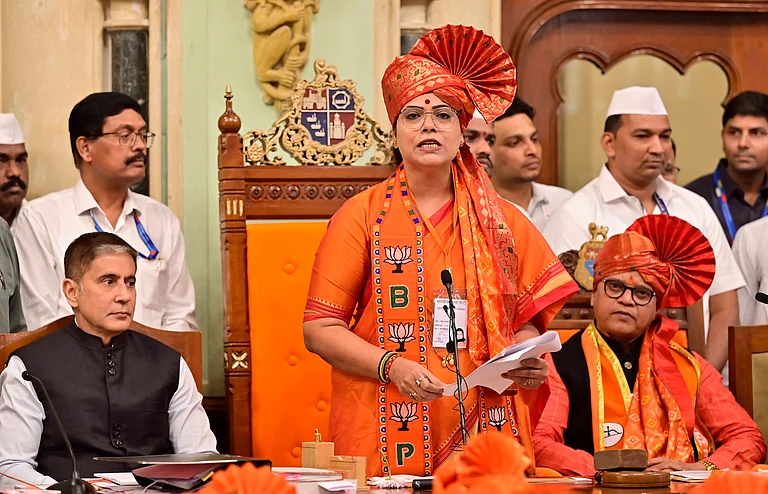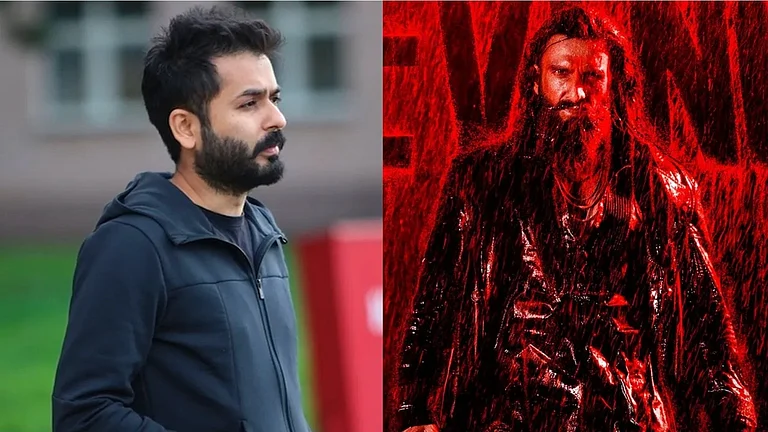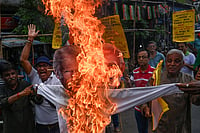
Summary of this article
Over 100 Jaybhim Nagar residents face eviction after the HC ordered BMC to clear huts from a Powai footpath.
Despite a 2021 ban on monsoon demolitions, BMC issued notices and brought machinery on August 18.
Families say they have nowhere to go in the rains; activists call the move a rights violation.
On August 18, at around four in the afternoon, when the skies had darkened and heavy rain was pouring, Sonia Shivsaran stepped out of her hut on the footpath to assess the municipal corporation’s action. Sonia is eight months pregnant and has a two-year-old child. Along with her, half a dozen women living in shanties on the footpath near Jaybhim Nagar in Powai stood watching. Around 100-150 people are facing the threat of becoming homeless in the middle of the rains.
Last year, in June 2024, the Brihanmumbai Municipal Corporation (BMC) bulldozed the Jaybhim Nagar slum, declaring it an encroachment. Hiranandani Builders had filed a petition claiming the land where the settlement stood was private property and needed to be vacated. The verdict was delivered in their favour. Accordingly, the BMC demolished the houses there.
Sonia and nearly 600 others lost their homes. Many were displaced and scattered across different places, while around 60-70 families built plastic huts on a nearby footpath. These makeshift homes are on the footpath in front of the Tivoli building in the Hiranandani Colony area.
In 2025, the Tivoli Housing Society filed a petition in the High Court against the BMC, arguing that these huts blocked the footpath, leaving no space for pedestrians, troubling senior citizens and children. The petition claimed: “Since a footpath is a public place, people building huts and living there is an encroachment. It is the responsibility of the corporation to clear them, which it has failed to do. The corporation must clear the footpath.”
The Bombay High Court ruled in favour of Tivoli Housing Society in August 2025, stating that the demand to clear the footpath was valid and that the corporation must act accordingly.
The BMC issued notices to the residents on the Jaybhim Nagar footpath, ordering them to vacate immediately. But the residents argued: “Where can we go in this rain at such short notice? Our original houses were demolished in June 2024, violating our housing rights. Now, if we vacate, where do we take our children?”
On August 18, BMC officials and staff arrived at Jaybhim Nagar for the demolition. But resident Meenabai Nimbole had filed a petition in the Bombay High Court seeking interim relief, asking for a stay on demolition until the monsoon ended. The HC did not grant a stay. This has left the residents fearing that evictions are now inevitable.
When we visited the site on August 18, despite the heavy rain, three large municipal trucks, a bulldozer, and a bus to shift affected families to the shelter were present at the site, along with 30-40 municipal employees ready for demolition. But since HC’s decision on the interim relief petition was still pending, the demolition did not start on that day.
“We’ve been here since morning to begin the (eviction) work, but our senior officer (the Commissioner) told us to wait until the High Court’s order. That’s why we didn’t begin. But if not today, tomorrow it will happen anyway. Honestly, it doesn’t feel right to demolish people’s homes in this rain, but we have orders from above, what can we do?” a municipal worker said on the condition of anonymity.
By the time HC’s decision came on August 18, it was nearly 7 PM and getting dark. The municipal staff left without starting demolition. On August 19, heavy rainfall in Mumbai led to a red alert, and no demolition took place. Residents fear that once the rain subsides after August 20, the demolitions will begin.
“On August 16, we got a notice from the corporation to vacate our huts within 24 hours. But in this kind of rain, where can we take our families? It’s impossible to even find rented houses these days,” said Ashiq Mohammad Shaikh, a resident.
In 2021, the Maharashtra Urban Development Department issued a circular instructing all municipal corporations in the state not to demolish unauthorised structures during the monsoon months (June to September). But this order is not being followed in Jai Bhim Nagar’s case by the BMC.
Forced evictions affect people’s livelihoods, disrupt children’s education, and, in most cases, violate human rights, mentions the Forced Evictions in India- 2021 report.
“All we are asking the government and the court is, please don’t evict us during the monsoon. Carry out the action after Diwali,” said Chanda, a local resident, in tears.
Lalita Devkar, 35, also lives in this settlement. Her parents and in-laws had migrated from Nanded to Mumbai forty years ago and settled permanently in Jaybhim Nagar. “These Hiranandani residents call us ‘garbage’. But the very buildings they live in were built by my parents and in-laws, as labourers. Now they go to court and demand that we be thrown out,” she said. Lalita has four children; her eldest son is in the 10th grade. She said their studies are badly affected by the rain. “In this weather, where should we take our children? We don’t live on the footpath by choice but out of compulsion. We have no electricity connection; our children study in the dark. We have to cook in the light of mobile phones. There is no water supply or gas cylinders. We try to light a chulha, which doesn’t work properly in the rain. Don’t we have the right to live?” she asked.
At the site, children, the elderly, and women all are grappling with the anxiety that a bulldozer could arrive at any moment to evict their huts. Their only hope was that the HC might grant a temporary stay on the demolition order.
“The language of encroachment about the urban poor commits robbery to their identity and citizenship. Especially in the Jai Bhim Nagar case, when people staged a brave struggle after the illegal demolition, no state agencies heard their demands. Numerous letters were submitted to the court, a Special Investigation Team (SIT) was constituted by the HC, the Human Rights Commission, the Minority Commission and leaders from all the parties got involved, but their demand for a home after facing brutal illegal demolition has not been materialised,” said Huma Namal, a research scholar and activist supporting the Jai Bhim Nagar residents in their demand for housing rights.
Huma and other student activists have been voluntarily raising the issue of housing rights. “After sustaining their struggle for 450 days, they are called encroachers. This is an insult to their democratic rights. The role the BMC has played in suppressing people’s legitimate demand for housing (which we have documented throughout) only shows that it is the BMC that is encroaching on the rights of the poor who have built those high rises of Powai.”
Outlook reached out to the BMC commissioner Bhushan Gagrani, specifically to know the BMC’s stand on the 2021 government circular ordering no evictions of unauthorised structures should take place during the monsoon months of June to September. We are waiting for his response.


























